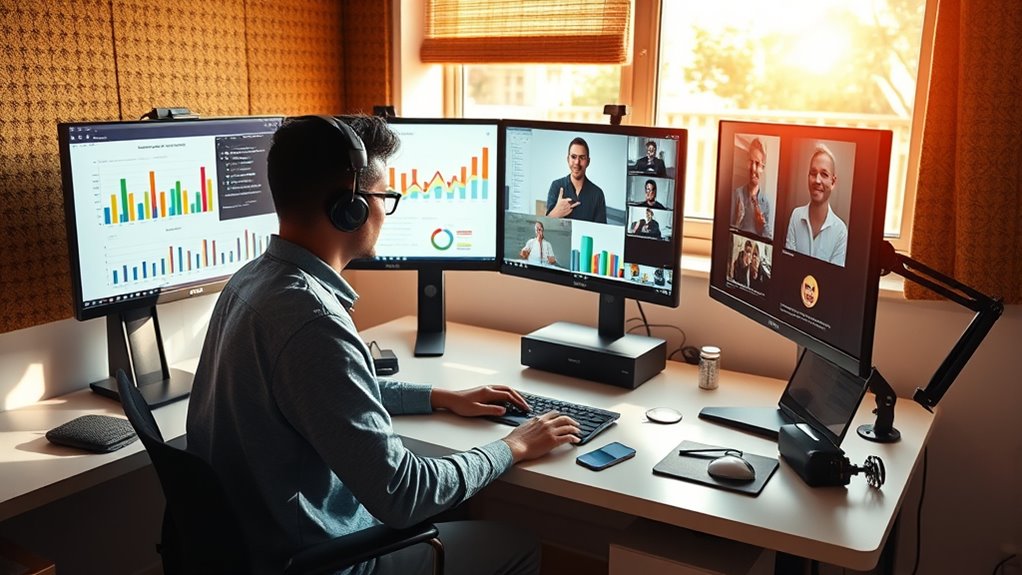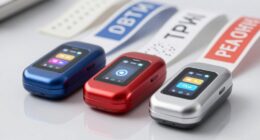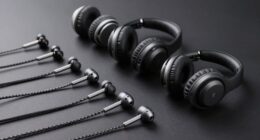You can thrive in the gig economy by harnessing assistive technologies like captioning, sign language apps, and video relay services to overcome communication barriers. Building a strong support network of fellow Deaf professionals and continually developing in-demand skills will boost your confidence and opportunities. Promoting accessibility in your workspace and showcasing your expertise help attract clients and create inclusive collaborations. If you keep exploring, you’ll discover more ways to succeed and grow as a Deaf freelancer.
Key Takeaways
- Leverage assistive technologies like real-time captioning, sign language translation, and video relay services to enhance communication.
- Build a strong support network through networking events, mentorship, and community engagement for guidance and opportunities.
- Develop marketable skills such as sign language, digital marketing, or graphic design to stand out and attract clients.
- Promote accessibility by utilizing visual communication tools and adaptive tech to foster inclusive collaboration.
- Showcase expertise with a tailored portfolio, testimonials, and active online presence to attract freelance opportunities.
real-time captioning device for video calls
As an affiliate, we earn on qualifying purchases.
As an affiliate, we earn on qualifying purchases.
Overcoming Communication Barriers in Freelance Work

How can deaf freelancers effectively bridge communication gaps in their work? The key is embracing sign language integration whenever possible. Learning basic signs related to your field can help you communicate more confidently with clients and collaborators. Additionally, you should establish clear communication etiquette upfront—such as confirming preferred methods of contact and setting expectations for response times. Use visual tools like video calls with captioning or sign language interpreters to facilitate seamless dialogue. Being proactive about your communication needs demonstrates professionalism and helps clients understand how to work effectively with you. Remember, clear, respectful communication fosters trust and minimizes misunderstandings, allowing you to thrive in the gig economy despite barriers. Incorporating contrast ratio considerations into visual communication tools can enhance clarity and comprehension for all parties.

Real-Time AI Translation Earbuds, 198 Language Translator Earbuds, Audifonos Traductores Inglés Español, 3-in-1 Translating Earbuds for Travel, Meetings & Language Learning, with Charging Case
1️⃣ Instant Real-Time Translation in 198 Languages Break language barriers instantly. These AI translation earbuds support real-time, two-way…
As an affiliate, we earn on qualifying purchases.
As an affiliate, we earn on qualifying purchases.
Technology as a Catalyst for Accessibility

Technology transforms how you access and participate in the gig economy by offering assistive communication tools, real-time captioning, and improved video conferencing. These innovations make it easier to connect with clients and colleagues without language barriers. Embracing these solutions can considerably enhance your opportunities and independence. For example, Honda Tuning techniques demonstrate how targeted modifications can optimize performance, much like how accessibility tools tailor the work environment to individual needs. Furthermore, digital accessibility ensures that all users can fully utilize these technological advancements to support their professional growth. Additionally, leveraging expert voice actors and immersive soundscapes can help create engaging content tailored to diverse audiences. Recognizing the importance of emotional support can also help maintain motivation and resilience while navigating the challenges of freelance work. Incorporating assistive technologies accelerates integration into the gig economy by making tasks more manageable and inclusive.
Assistive Communication Tools
Assistive communication tools have revolutionized accessibility for deaf individuals in the gig economy by enabling more effective and instant interactions. With advances in technology, you can now use assistive devices that translate speech into text or sign language, making communication smoother. Video relay services allow you to connect with clients who understand sign language, reducing misunderstandings and delays. Mobile apps tailored for sign language help you convey complex ideas quickly, improving collaboration. These tools break down barriers, allowing you to participate fully in freelance projects. By integrating assistive devices into your workflow, you gain independence and confidence, opening more opportunities. Technology continues to enhance your ability to thrive independently, empowering you to succeed in a competitive, accessible gig economy. Additionally, cultural perceptions surrounding deafness are evolving as society becomes more inclusive, further supporting your professional growth. Embracing innovations such as assistive technology fosters a more inclusive environment, encouraging wider acceptance and understanding. Furthermore, the development of specialized sound design tools tailored for accessibility can help create more inclusive multimedia content, expanding your creative possibilities. Additionally, the availability of reliable security systems ensures your work environment remains safe and protected, allowing you to focus on your projects with peace of mind. Moreover, understanding educational resources can further empower deaf freelancers to develop new skills and stay competitive in the evolving gig economy.
Real-Time Captioning Solutions
Real-time captioning solutions have become a game-changer for deaf gig workers by providing instant, accurate transcriptions of spoken content. These tools enable you to follow conversations, meetings, and client interactions more effectively, reducing reliance on sign language in fast-paced environments. With real-time captions, you can participate fully without missing key details, increasing your confidence and independence. Peer mentorship plays a crucial role here, as experienced users can guide newcomers on maximizing captioning technology’s benefits. By sharing tips and troubleshooting, mentors help you integrate these solutions seamlessly into your workflow. As technology evolves, real-time captioning continues to break down barriers, empowering you to thrive in freelance and self-employment settings with greater accessibility and communication clarity. Security systems are also increasingly integrating smart technology to enhance safety and convenience for users. Additionally, understanding the different types of captioning technology available can help you choose the most suitable tools for your specific needs. Exploring Glycolic Acid benefits can further enhance your skincare routine, promoting healthier, more radiant skin that boosts your overall confidence.
Enhanced Video Conferencing
Enhanced video conferencing has revolutionized how deaf gig workers connect and collaborate, breaking down communication barriers that once limited remote participation. With features like integrated sign language interpretation, you can now easily access fluent communication without relying solely on captions. Visual cues, such as real-time gestures and on-screen indicators, help you stay engaged and understand context more effectively. These tools allow you to interpret emotions, emphasis, and subtle cues that enrich conversations. As a result, collaboration becomes more natural and inclusive, enabling you to contribute confidently. Enhanced video conferencing fosters a sense of presence and community, making remote work more accessible and satisfying for deaf gig workers. This technology truly empowers you to thrive in the gig economy, breaking down barriers that once hindered your full participation. Additionally, understanding city dynamics and leveraging local resources can further enhance your integration and success in the remote work environment. The integration of assistive technologies continues to evolve, offering even more tailored solutions for different needs within the deaf community. Exploring technological advancements can further improve your remote collaboration experience and open up new opportunities for growth.
video relay service for deaf users
As an affiliate, we earn on qualifying purchases.
As an affiliate, we earn on qualifying purchases.
Building a Support Network of Deaf Professionals

Building a strong support network of Deaf professionals can considerably boost your confidence and open doors to new opportunities. Attending networking events allows you to connect with peers, share experiences, and discover job leads. Mentorship programs pair you with experienced Deaf professionals who can offer guidance, advice, and encouragement. These relationships help you navigate challenges and develop skills essential for success in the gig economy. Utilizing resources like industry-specific support can further enhance your professional growth and resilience. Additionally, being aware of popular juice brands and healthy beverage options can support your overall well-being as you build your career. Recognizing unique traits of Deaf professionals can also help foster a more inclusive and understanding work environment, and engaging in inclusive wellness practices like yoga can promote mental and emotional resilience. Understanding the financial impact of entertainment industries can inspire strategies for managing your income effectively.

6Pcs Communication Board for Non Verbal Adults Picture Symbol Communication Cards Speech Therapy Tools for Autism Toddlers Kids Aphasia Stroke Patients Hospital Care Home Use Talking Placemats
Package includes: This set includes 6 communication boards, each designed with different themes to help individuals express their…
As an affiliate, we earn on qualifying purchases.
As an affiliate, we earn on qualifying purchases.
Navigating Client Relationships and Expectations

Managing client relationships and expectations is essential for success in the gig economy, especially for Deaf professionals who often communicate differently. Clear client communication is key to avoiding misunderstandings and building trust. Be upfront about your preferred methods, whether via email, video relay, or instant messaging, and encourage clients to share their expectations early. Expectation management involves setting realistic deadlines and deliverables from the start, so both parties are aligned. Regular updates help ensure everyone stays on the same page and allows you to address concerns promptly. Being proactive in clarifying details prevents miscommunications that could impact your reputation. Understanding electric bike specifications and how they relate to project scope can enhance your ability to communicate effectively with clients about technical details. Additionally, understanding the significance of spoilage indicators in products like lemon juice can improve your ability to advise clients on quality standards and product handling. Developing communication accessibility tools can further support clear interactions with clients who have diverse communication needs. Incorporating necessary cookies into your communication tools ensures that essential functionalities are maintained during interactions. With effective client communication and expectation management, you’ll foster strong relationships that support your freelance success.
Developing Marketable Skills for the Gig Economy

To succeed in the gig economy, you need to identify what skills are in demand and develop your technical expertise accordingly. Building a strong portfolio that showcases your work helps attract clients and demonstrates your capabilities. Focusing on these areas can make your services more marketable and increase your chances of landing gigs.
Identifying Market Needs
How can you guarantee your skills align with current market demands in the gig economy? Start by conducting thorough market research to understand trending skills and customer needs. Focus on customer segmentation to identify specific groups seeking your services. This helps you tailor your offerings and stand out. Use the table below to analyze different market segments:
| Segment | Needs |
|---|---|
| Small Business Owners | Affordable digital marketing skills |
| Remote Professionals | Quick tech support or content creation |
| Local Events | Sign language interpreting services |
Building Technical Expertise
Building technical expertise is the foundation of developing marketable skills in the gig economy. To stand out, focus on sharpening specific skills relevant to your niche. For deaf freelancers, mastering sign language can be a significant advantage, enabling you to communicate effectively and attract clients seeking sign language services. Additionally, earning technical certifications in areas like digital marketing, graphic design, or coding can boost your credibility and open new opportunities. These certifications demonstrate your commitment and competence, making it easier to secure gigs. Continuously updating your skills ensures you remain competitive and adaptable in a dynamic marketplace. By investing in sign language proficiency and relevant certifications, you build a strong skill set that enhances your value and positions you for long-term success.
Showcasing Your Portfolio
Showcasing your portfolio is essential for demonstrating your skills and attracting clients in the gig economy. A well-crafted portfolio highlights your expertise, builds credibility, and supports your branding strategies. To stand out, tailor your showcase to specific niches and include diverse samples of your work. Clear presentation is key for smooth client onboarding—use visuals, concise descriptions, and testimonials. Consider creating an online platform or website that’s easy to navigate and visually engaging. Use the table below to organize your portfolio ideas:
| Content Type | Purpose | Best Practices |
|---|---|---|
| Work Samples | Prove skills and style | Showcase variety & quality |
| Client Testimonials | Build trust and credibility | Highlight positive feedback |
| Service Descriptions | Clarify offerings | Be clear and specific |
| Branding Elements | Strengthen your identity | Consistent visuals & tone |
| Contact Info | Facilitate client outreach | Make accessible & straightforward |
Leveraging Social Media and Online Platforms

Have you considered how social media and online platforms can transform your freelance opportunities? By focusing on social media branding, you can craft a compelling online presence that highlights your skills and unique perspective. Platforms like LinkedIn, Instagram, and Twitter allow you to showcase your work, share your insights, and connect with potential clients. Online networking is essential; engaging with industry groups, participating in discussions, and building relationships can lead to referrals and collaborations. Use captions, videos, and visuals to communicate your message clearly and authentically. Remember, consistency builds recognition. With a strategic approach to social media and online platforms, you can expand your reach, attract new clients, and thrive in the gig economy as a Deaf freelancer.
Creating Inclusive and Accessible Workspaces

You can make workspaces more inclusive by using visual communication tools like captions and sign language videos. Adaptive technology, such as speech-to-text apps, helps bridge communication gaps. Implementing collaboration strategies that prioritize clear, accessible communication guarantees everyone can contribute effectively.
Visual Communication Tools
Visual communication tools play a crucial role in creating inclusive and accessible workspaces, especially for deaf employees. Using sign language effectively guarantees clear communication, allowing you to express ideas and clarify instructions without barriers. Incorporating visual cues like charts, diagrams, and color-coded signals helps you stay organized and understand information quickly. These tools reduce misunderstandings and foster a more collaborative environment. By prioritizing visual communication, you make your workspace more welcoming and functional for deaf team members. You can also encourage others to learn basic sign language or use visual aids during interactions. Overall, these strategies empower you to thrive in freelance or self-employed roles, ensuring your communication is seamless and your workspace remains inclusive and equitable.
Adaptive Technology Use
Adaptive technology plays a vital role in creating inclusive and accessible workspaces for deaf individuals by providing tools that bridge communication gaps. These tools enhance understanding and foster independence. For example, real-time captioning converts speech into text, while sign language apps facilitate communication with clients and coworkers. Visual cues, like flashing alerts or digital notifications, help you stay informed without sound. Additionally, video relay services allow seamless conversations using sign language, and adaptive hardware like vibrating wristbands can signal important updates.
- Real-time captioning for meetings
- Sign language translation apps
- Visual alerts for notifications
- Video relay service options
- Vibrating alert devices
Inclusive Collaboration Strategies
Creating inclusive collaboration strategies is essential for ensuring deaf individuals can participate fully in team efforts. By fostering an environment of interpersonal trust, you encourage open communication and mutual respect, which strengthens team cohesion. Incorporate accessible tools like real-time captioning, sign language interpreters, and visual communication platforms to make collaboration seamless. Building a positive workplace culture that values diversity and inclusivity helps everyone feel valued and empowered. When team members understand the importance of accessibility, collaboration becomes more effective, innovative, and respectful. Remember, inclusive strategies aren’t just about tools—they’re about creating a space where all voices are heard, and differences are embraced. This approach not only benefits deaf team members but enhances overall productivity and morale.
Success Stories: Inspiring Deaf Freelancers

Many deaf freelancers have broken barriers and built successful careers by leveraging their unique skills and determination. Their stories inspire others to pursue their passions in the gig economy. Some have found success in music therapy, using their understanding of sound and emotion to help others. Others thrive as sign language interpreters, connecting people across language barriers. These freelancers often adapt their skills to meet market needs, creating niche services. Their perseverance proves that deaf professionals can excel in various fields.
Deaf freelancers succeed by leveraging unique skills, inspiring others to innovate and excel across diverse fields.
- Building a brand around music therapy expertise
- Offering specialized sign language interpretation services
- Utilizing social media to showcase skills
- Networking within deaf and hearing communities
- Continuously learning new tools and techniques
Their success highlights the power of resilience and innovation.
Challenges and Strategies for Long-Term Sustainability

While the achievements of deaf freelancers demonstrate their resilience, maintaining long-term success presents ongoing challenges that require strategic planning. Financial planning is essential to manage fluctuating income streams and cover unpredictable expenses. Building a savings buffer helps you stay secure during slow periods. Equally important is prioritizing mental wellness; the isolation and stress of freelance work can take a toll. Regularly setting boundaries, practicing self-care, and seeking support help you stay balanced. Staying organized with clear goals and diversifying your client base reduce risks and ensure steady work. Embracing accessible tools and communication methods boosts confidence and productivity. By proactively addressing financial stability and mental health, you set a strong foundation for sustained success in the gig economy.
The Future of Deaf Participation in the Gig Economy

As technology advances and awareness around accessibility grows, the opportunities for deaf individuals to participate in the gig economy are expanding. Future opportunities include innovative apps, accessible platforms, and adaptive tools that empower self-employment. These developments could lead to greater independence and economic inclusion for deaf workers. However, policy implications are vital; governments and organizations must create supportive frameworks to guarantee equitable access.
Key ideas include:
- Implementation of accessible gig platforms
- Incentives for inclusive technology development
- Policies promoting equal pay and rights
- Training programs for digital skills
- Collaboration between tech companies and disability advocates
Frequently Asked Questions
How Can Deaf Freelancers Effectively Negotiate Payment and Contracts?
You should focus on clear payment strategies, setting your rates upfront, and using written agreements to prevent misunderstandings. Knowing contract essentials, like scope of work, deadlines, and payment terms, helps protect your rights. Communicate openly with clients about your needs, and don’t hesitate to ask for amendments if necessary. Staying organized and confident ensures you negotiate effectively, securing fair compensation and building professional relationships.
What Legal Rights Do Deaf Freelancers Have in Freelance Work?
They say, “Knowledge is power,” and as a deaf freelancer, understanding your legal rights is essential. You have legal protections under laws like the ADA and Section 508 that ensure accessibility rights and prevent discrimination. These laws help guarantee equal opportunities, fair treatment, and accommodations. Stay informed about your rights, advocate for yourself, and know that the law supports your right to work in a fair, inclusive environment.
How Can Deaf Entrepreneurs Access Funding or Grants?
You can access funding or grants by researching accessible funding options tailored for entrepreneurs with disabilities. Look for organizations offering grant opportunities specifically for deaf entrepreneurs, including government programs, nonprofit initiatives, and private foundations. Reach out to local business support agencies or disability advocacy groups for guidance. Applying for these grants often involves demonstrating your business plan and accessibility needs, ensuring your enterprise gets the support it deserves.
What Are Best Practices for Marketing as a Deaf Freelancer?
To market yourself effectively as a deaf freelancer, focus on strong visual branding that highlights your unique skills and personality. Use social media platforms to showcase your work, share your story, and connect with potential clients. Engaging visuals and authentic content help you stand out. Remember to be consistent, authentic, and proactive in your online presence, making it easier for clients to find and trust your services.
How Do Cultural Attitudes Impact Deaf Individuals in the Gig Economy?
Imagine you’re steering freelance work, and cultural acceptance varies across communities. These attitudes can influence how openly you communicate and seek opportunities, as cultural acceptance fosters inclusivity while negative perceptions create communication barriers. For example, in some regions, deaf freelancers face stereotypes that hinder collaboration. Your success depends on both challenging these barriers and finding supportive networks, emphasizing the importance of understanding cultural attitudes within the gig economy.
Conclusion
Did you know that 85% of deaf freelancers report increased independence and job satisfaction? Embracing technology, building strong networks, and developing your skills can help you thrive in the gig economy. By creating accessible work environments and advocating for inclusivity, you open opportunities for long-term success. Your unique perspective is a powerful asset—don’t let communication barriers hold you back. The future is bright for deaf professionals, and your journey is just beginning.










